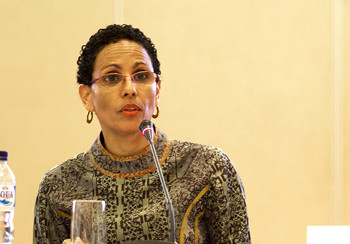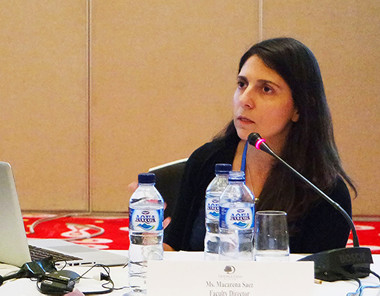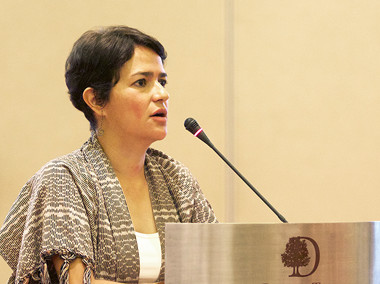Judging with a Gender Perspective
Date:
Jakarta, Indonesia - UN Women, the United Nations Entity for Gender Equality and the Empowerment of Women in collaboration with the International Commission of Jurists (ICJ) and the Supreme Court of Indonesia co-organized the Regional Judicial Dialogue on Judging with a Gender Perspective on 5, 6 October 2015 in Jakarta, Indonesia.
Officially opened by Prof. Dr. Takdir Rahmadi, SH.LLM, Justice of the Supreme Court of the Republic of Indonesia, the dialogue focused on efforts to eliminate stereotyping, incorporating gender perspective, and applying the Convention on the Elimination of All Forms of Discrimination against Women (CEDAW) principles in judicial decision-making.

“There is ample evidence that judicial transparency is key for women to be able to claim their rights and that lack of transparency also limits judiciaries themselves in assessing and addressing discriminatory attitudes within their own ranks” said Roberta Clarke, UN Women Asia Pacific Regional Director.
The event brought together 50 judges and representatives from different court levels and judicial training institutions. The participants discussed gender stereotype cases encountered in different countries and exchanged knowledge of best practices from other regions which face similar challenges to judge with a gender perspective.

“One of the most profound gender stereotypes affecting women is the idea that their natural role and sense of being is motherhood” said Macarena Saez, Faculty Director of the Washington College of Law’s Impact Litigation Project.
One of the best practices discussed was presented by the Mexican Supreme Court which had led the development of the protocol: ‘Judicial Decision-making with a gender perspective’ intended to ensure compliance with its constitutional and international obligations to promote, respect, protect and guarantee the realization of human rights in the country.

“The obligation of all judicial authorities must not only prevent, investigate and punish gender-based violence, but also to guarantee access to legal and administrative mechanisms are adequate and effective to fight discrimination and violations of human rights of women” said Karla Quintana, from the Mexican Supreme Court of Justice.
The dialogue provided judges with the opportunity to discuss effective implementation of gender perspective using cases provided during the group discussion. In the end of the session, judges presented their recommendations on next steps to be taken to make sure increased awareness of CEDAW commitments.
The event was conducted to strengthen judges’ skills and knowledge to eliminate discrimination against women in the justice system. It was a follow-up to the colloquium “Gender Equality Jurisprudence and the Role of the Judiciary in Promoting Women’s Access to Justice” held in 2013 and “Good Practices in Promoting Women’s Human Rights Compliant Justice Delivery” held in 2014.
In following up on the recommendations from the meeting, UN Women and ICJ commissioned two pieces of research: “Gender stereotypes in laws and court decisions in Southeast Asia’ and “CEDAW Casebook: An Analysis of Case Law in Southeast Asia”. These works, are expected to advance a common understanding across the region on how CEDAW, its values of substantive equality, non-discrimination and state obligation should be applied to address judicial bias, conscious or unconscious so that women access justice and the rule of law.
For more than 10 years now, the Government of Canada through its Department of Foreign Affairs, Trade and Development (DFATD) has supported UN Women to promote the implementation of CEDAW and work with countries in Southeast Asia to put in place measures to ensure that the promises of substantive equality enshrined in the convention are concretized in all aspects of women’s daily lives.
Contact information:
Communications Queries
Radhiska Anggiana, Communication Officer, UN Women Indonesia Project Office
Email: [ Click to reveal ]
Program Queries
Pimvadee Keaokiriya, Regional Programme Office, UN Women Regional Office for Asia and the Pacific
Email: [ Click to reveal ]